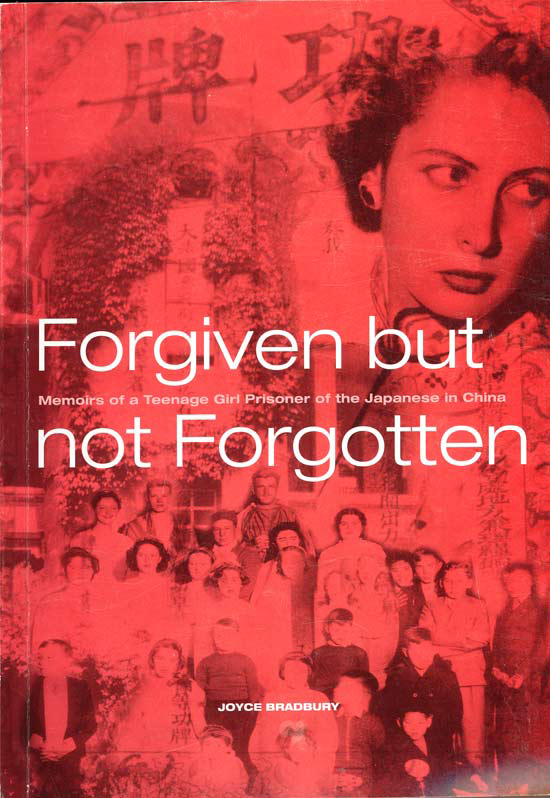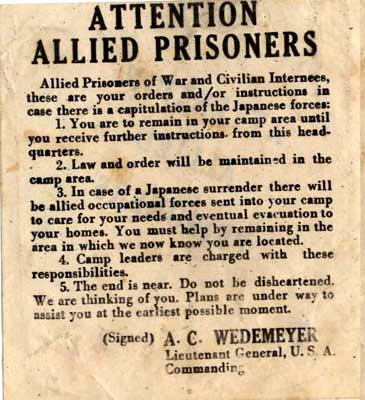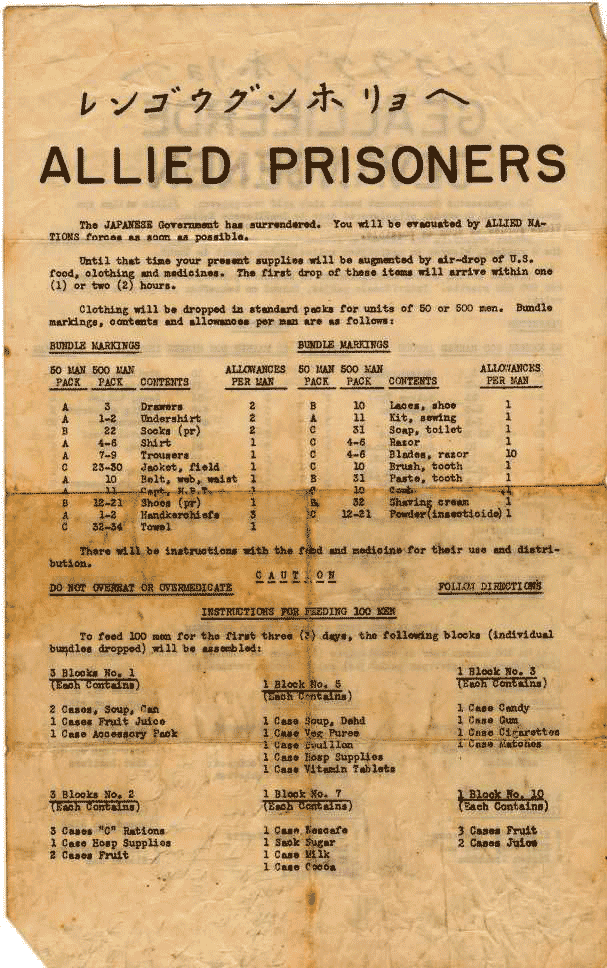
- by Joyce Bradbury, née Cooke
[Excerpts] ...
[...]
 It wasn’t long before other American aeroplanes came and dropped many canisters together with leaflets warning us not to overeat.
It wasn’t long before other American aeroplanes came and dropped many canisters together with leaflets warning us not to overeat.
With glee, we fell upon the canisters and found they contained wonderful things. Cardboard cartons of tinned food, clothing, medical supplies, toiletries and now, I cannot recollect what, if anything, happened to any of the Japanese officers or guards.
They just weren’t there any more.
I certainly did not worry about them or even give them a thought. Had anything untoward happened to them I would have been told about it.
On the first day of our liberation, we ate our normal rations but from then on we dined well.
The first lavish feast consisted of bread, butter, cheese, jam and everything else together despite the warnings from the American soldiers not to overeat.
As it turned out, we could not eat much. We had been starved for so long that our stomachs had consequently shrunk. It therefore took me two days to eat my first lavish meal but even then we didn’t waste anything. We always saved the leftovers for the next meal.
As the days passed, more US soldiers arrived in trucks. There were many of them. They helped with the running of the camp and everything went well. The soldiers must have been technicians because they got everything working in the camp including supplies of hot water in abundance.
[excerpt]
We really knew we were liberated when we were woken one morning by loudspeakers all around the camp blaring the song:
‘ Oh, what a beautiful morning .’
From then on it was the signal every day to remind us that we were free again. What a lovely feeling and a lovely song. I shall never forget it or any song from the stage musical Oklahoma. They were constantly played over the loudspeakers.
[excerpt]

During this period, Tsolik Baliantz and I got hold of some parachute material which was pure silk and extremely strong. She made me two blouses and a skirt from the material. One white blouse and one red skirt and blouse. She used one of the camp’s portable sewing machines that my mother had used earlier to make me a pair of shorts and a top out of an old dress.
After liberation, every family was issued with cartons of tinned food from the canisters. There was no necessity to cook ― everything was prepared. Cheese, butter, jam, corned beef, tongue, Spam (a brand of canned processed luncheon meat) and chipolata sausages.
They were all packed in khaki green coloured cans. There were also biscuits that the American soldiers called dog biscuits.
The Americans didn’t forget anything in their food parcels. The parcels even had little can openers. Among the parcels came plenty of cigarettes. So mum, and I think my father, took up smoking again.

[excerpt]
The adults had to attend meetings chaired by American officers where they were told of the progress in returning us to our homes. They told us to be patient because it would take some time.
For my family it took about two months.
[excerpt]
The American civilian internees were the first to go. I know some of them declined repatriation to the United States because their homes were in China and they wanted to stay there. As for my family, the only home we knew was Tsingtao and that’s where we wanted to go.
I don’t remember being impatient to go home because I started to enjoy myself.
No more being dragged out into the open for roll call. There were dances every Saturday night with the soldiers. The American soldiers were extremely polite and well mannered. They appeared strong and healthy. Everybody liked them. We rightly regarded them as our saviours.
Inevitably, I got into trouble with my boyfriend,
[... further reading ...]
[excerpt]
Because we had no suitcases for our belongings, we accumulated cartons from the food parcels to take our meagre belongings back to Tsingtao.
We didn’t have much at all.
I just had my camp souvenirs. Prized among them is a large collection of signatures which include the signatures of the parachutists and many of the camp inmates. #
[further reading]http://www.weihsien-paintings.org/books/ForgivenForgotten/Book/ForgivenNotForgotten(WEB).pdf
#








